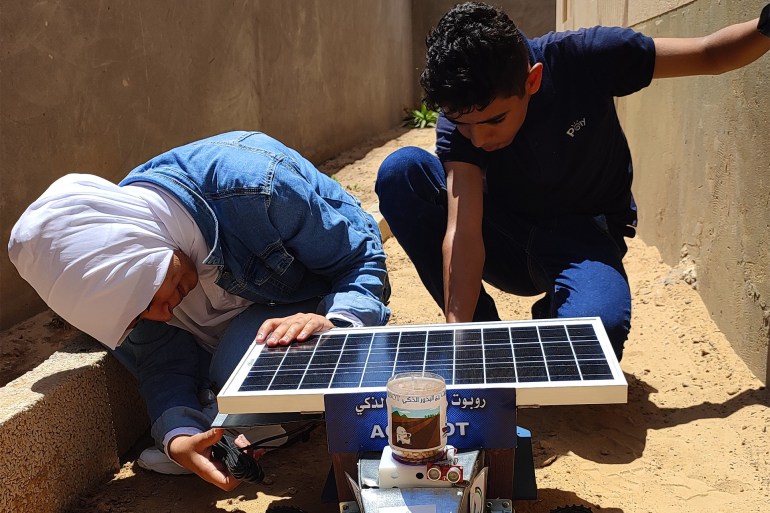GAZA -
A trip to the agricultural lands was enough for the two brothers, Malak and Ibrahim Abu Al-Rus, to experience the suffering of farmers, especially those whose lands are located close to the Israeli security fence in the eastern Gaza Strip.
This suffering preoccupied the two brothers, and occupied a space in their thinking in search of an answer to their question: How can the suffering of these farmers be ended and their lives constantly threatened, as a result of the repeated targeting by the occupation forces, which impose a buffer zone hundreds of meters deep and about 40 kilometers long along the security fence, And deny farmers access to their land?
Malak (15 years old) and Ibrahim (13 years old) did not think long, and were guided to invent an agricultural "robot", which in the case of Gaza can be described as a "combat robot farmer" that can perform dangerous and complex tasks instead of farmers.
The idea and the goal
Malak and her brother Ibrahim achieved an unprecedented achievement by winning the grand prize in the "National Olympiad for Programming and Artificial Intelligence", a scientific and technical exhibition that included other achievements in Gaza.
Malak told Al Jazeera Net that farmers in Gaza work in uncomfortable and dangerous conditions, and this robot can help them save time, effort and money, in addition to protecting many of them from real dangers that threaten their lives during their daily work in their agricultural lands near the border areas.
And traditional farming methods - according to Malak - have many negatives that affect production, and prevent the maximum benefit from the agricultural area.
She seemed to be a king older than her age, as she spoke in many accurate scientific details about the benefits of the robot in precision agriculture in terms of equal measurements of seeds, in terms of depth in the soil and the distance between the seed and the other.
These benefits are multiplied for the Gaza Strip, with its small area, which suffers from a continuous decrease in its agricultural lands due to urban expansion, or as a result of Israeli hostile policies, and Malak says, "The generalization of the robot to farmers in Gaza will provide them with safe working conditions."
The robot passed successful tests to perform the tasks required of it (Al Jazeera Net)
Mechanism of Action
The process of making the robot required about 3 months, in addition to a month of practical experience, and Ibrahim told Al Jazeera Net, "We carried out successful experiments with the robot, during which we made sure of its accuracy in work and performing the functions required of it."
These jobs, according to Ibrahim, are summarized in digging and sowing seeds, while he and his sister Malak are currently developing the robot to perform other tasks such as harvesting and spraying water and agricultural pesticides.
The robot performs these tasks through an application on a mobile phone, designed by Ibrahim Al-Shaghouf, while the distinguished king in mathematics and physics took care of the rest during their successful journey to create this robot, under the supervision of their father, Saeed Abu Al-Roos, an electronics and control engineer at Palestine Technical College.
Malak and Ibrahim study at the "His Highness Sheikh Hamad bin Khalifa Al Thani" school in the city of Khan Yunis (south of the Gaza Strip), and they preserve the school's great role in the excellence that they enjoy, through which they derived a lot of theoretical scientific information about the "world of robots" within the technology subject. , benefited them during the scientific experiment, as well as the support and encouragement of teachers.
Aware of the stifling electricity crisis in Gaza, the two creative brothers were keen to provide the robot with a battery and a solar panel, allowing the robot to work continuously for more than 8 hours.
Just as their father had an important role in supervising, Malak and Ibrahim did not forget the psychological support of their mother, who helped them "organize time" and achieve harmony between study and hobby, leading to this achievement.
The robot contributes to protecting farmers from the dangers of occupation in the border areas in Gaza (Al-Jazeera Net)
Obstacles and future aspirations
The road of Malak and Ibrahim was not paved, and it was obstructed by obstacles imposed by the conditions of the Israeli siege, and the restrictions that prevent the arrival of many types of materials to Gaza, claiming that they are "dual-use" and fear that they will reach the resistance and be used in the manufacture of weapons.
However, the two brothers' creative thinking was to overcome this dilemma, by recycling used materials instead of lost materials. "We used pieces of old toys and household tools to complete the manufacture of the robot," Malak said.
The dreams of Malak and Ibrahim - who are looking forward to studying engineering in the future - do not stop at the limits of this innovation, and they dream of creating other smart robots that contribute to solving complex problems in Gaza related to the medical field, and controlling the traffic situation to reduce road accidents.

